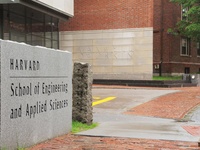All of this means more students than ever before may be declaring a concentration in engineering sciences, computer science, or applied mathematics in the coming years. But it remains an open question as to how the school will handle a potentially enormous influx of new students.
FACULTY BLOATING
To maintain a six to one student to faculty ratio in SEAS, the school hopes to employ the necessary number of non-tenure track faculty members to serve as instructors, earmarking applied math as one discipline that might receive a number of these preceptors and lecturers.
“If we have 200 new concentrators show up that weren’t there before,” Murray says, “we will add non-ladder faculty, including preceptors and lecturers.”
These additional teaching staff members, administrators say, would be a permanent addition to the school even after searches continue to add the approximately 30 new faculty members that the school ultimately hopes to employ.
These preceptors will be serving not only as teachers but also advisers who will “know the curriculum really well,” Murray says.
Associate Dean for Administration and Academic Affairs Edward Kleifgen notes that the school already employs lecturers, visiting lecturers, and other temporary non-ladder faculty frequently.
“I don’t think any of this detracts from the faculty leading the teaching effort here,” he says. “It’s supportive of the faculty.”
REWORKING FINANCES
Much of the engineering school’s future expansion will depend on the performance of the endowment—from which SEAS draws 45 percent of its yearly budget—as well as the school’s ability to find alternative sources of capital.
Next year, SEAS will be facing the same 12 percent reduction in its endowment payout as other Harvard schools, an income loss that the school will offset by drawing from the financial reserves it built up in the years before the financial crisis.
According to FAS Dean Michael D. Smith, FAS was in “tremendous growth mode over the past decade,” when SEAS was still in the process of saving.
“When you look at the times when the endowment was doing well, we were extremely prudent,” says Linda Fates, associate dean for the SEAS office of resource development. “Otherwise, today we would be in trouble.”
Nevertheless, the reserves will not provide an unlimited source of funds in the case that uncertainty about the global economy leads the markets to return to fall 2008 levels.
“If [the endowment] super-tanks again, we’re not getting 30 more faculty for a very long time,” Murray says.
Read more in News
New, Steady Hand at Law School













